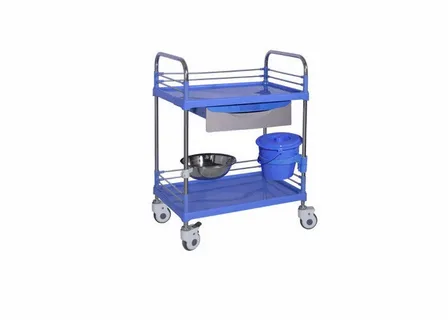Hospitals across India rely on trolley wheels and caster wheels / castor wheels for patient care and logistics. From patient stretchers and medicine carts to food delivery and waste disposal trolleys, wheels must operate smoothly, quietly, and safely. Any malfunction can affect patient comfort, delay operations, or even cause accidents. Therefore, hospitals must follow strict maintenance practices to ensure long-lasting and hygienic trolley wheel performance.
Here are the best practices for maintaining trolley wheels in hospitals:
-
Prioritize Hygiene and Cleanliness
Hospital environments demand the highest hygiene standards.
Checklist: – Clean wheels daily with disinfectant solutions safe for medical equipment. – Remove dust, hair, and medical debris stuck in wheel treads. – Avoid harsh acids or chemicals that may damage rubber or polyurethane wheels.
Tip: Opt for antibacterial or hygienic-grade polyurethane wheels designed for healthcare use.
-
Ensure Silent Operation
Noise can disturb patients, especially in ICUs and recovery wards.
Checklist: – Use thermoplastic rubber or Thermoplastic polyurethane wheels for silent rolling. – Inspect bearings for smooth, quiet rotation. – Replace noisy or squeaky wheels immediately.
Pro Tip: Hospitals should avoid cast iron or nylon wheels in patient areas, as they generate excessive noise.
-
Check Brakes Regularly
Hospital trolleys, such as medicine carts and stretchers, often come with brakes for patient safety.
Checklist: – Test brakes daily to ensure proper locking. – Inspect for slipping on tile or smooth hospital floors. – Replace faulty or loose brake mechanisms.
Tip: If skidding is a problem then can use elastic rubber wheel with tread grooves
-
Maintain Bearing Health
Bearings ensure smooth trolley movement without strain on staff.
Checklist: – Lubricate bearings monthly with hospital-safe grease. – Inspect for rust, which is common in humid Indian climates. – Replace bearings that cause jerky or stiff rolling.
-
Monitor Load Limits
Overloading trolleys leads to premature wheel failure.
Checklist: – Ensure each wheel’s load capacity is not exceeded. – Use heavy-duty caster wheels for laundry and equipment trolleys. – Train hospital staff not to overload stretchers or utility carts.
-
Inspect Floor Compatibility
Hospital floors are usually smooth (tile, vinyl, or epoxy-coated).
Checklist: – Use polyurethane or thermoplastic rubber wheels to avoid floor scratches. – Avoid nylon or cast iron wheels that may damage delicate flooring.
-
Schedule Preventive Maintenance
Instead of waiting for breakdowns, adopt a proactive schedule: – Daily: Clean and disinfect wheels. – Weekly: Inspect brakes and rolling performance. – Monthly: Lubricate bearings and tighten hardware. – Quarterly: Replace worn-out wheels.
-
Operator Training
Hospital staff should know how to handle trolleys safely.
Training Points: – Push trolleys instead of pulling to reduce strain. – Report unusual noise, wobbling, or brake issues immediately. – Avoid dragging trolleys over rough outdoor surfaces.
Conclusion
In Indian hospitals, properly maintained trolley wheels and caster wheels ensure safety, hygiene, and efficiency. By following these best practices, hospitals can extend wheel life, reduce noise, and provide a smoother experience for patients and staff alike.
Pro Tip for Indian Hospitals: Choose ISO-certified hygienic caster wheels that are corrosion-resistant, easy to clean, and designed for silent operation in medical environments.


